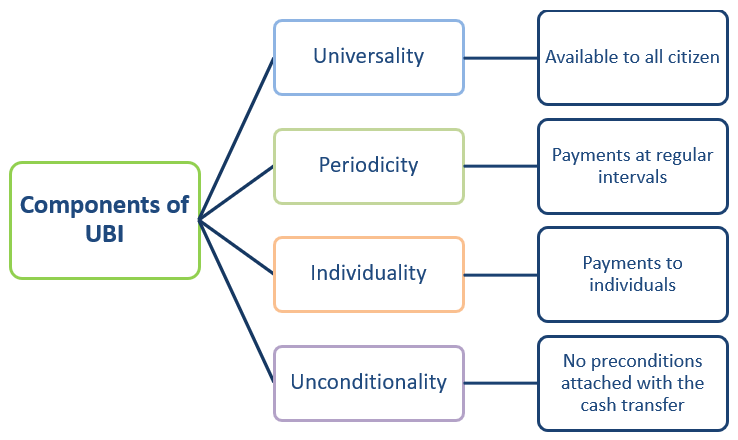Universal Basic Income
2023 JUL 27
Mains >
Social justice > Development Processes & Industry > Vulnerable & Backward sections
IN NEWS:
- Chief Minister of Karnataka stated that Karnataka is the first state to introduce the concept of Universal Basic Income through five guarantee schemes to promote economic dynamism.
- The Rajasthan state assembly recently passed “The Minimum Guaranteed Income Bill”. This Bill provides a “minimum guaranteed income” either by way of cash (Rs 1000 per month) or through employment (Rs 255 per day for a maximum of 125 days) to all the adults living in the state.
UNIVERSAL BASIC INCOME:
- Universal basic income (UBI) is an income support mechanism typically intended to reach all with no (or minimal) conditions.
- It requires that every person should have a right to a basic income to cover their needs, just by virtue of being citizens.

ARGUMENTS FAVOURING UBI:
- Promotes liberty:
- A UBI promotes liberty because it is anti-paternalistic, opens up the possibility of flexibility in labour markets, promotes equality by reducing poverty and promotes efficiency by reducing wastage in government transfers.
- Poverty Reduction:
- The circumstances that keep individuals trapped in poverty are varied. The state is not in the best position to determine which risks should be mitigated and how priorities are to be set.
- In the presence of a well-functioning financial system, empowering individuals through UBI may be the fastest way of reducing poverty.
- Agency:
- The poor in India have been treated as objects of government policy, which inflicts an indignity by assuming that they cannot take economic decisions relevant to their lives. An unconditional cash transfer treats them as agents, not subjects.
- Women empowerment:
- By taking the individual and not the household as the unit of beneficiary, UBI can enhance the agency of women within households.
- Enhance employment flexibility:
- UBI creates flexibility in the labour market. It allows for more non-exploitative bargaining since individuals will no longer be forced to accept any working conditions, just so that they can subsist.
- Administrative Efficiency:
- Existing welfare schemes are riddled with misallocation, leakages and exclusion of the poor. UBI is a way of ensuring that state welfare transfers are more efficient and that the state can concentrate on other public goods.
- Insurance against shocks:
- An assured income helps people face shocks such as bad health, job loss or aggregate shocks such as disasters.
- Promote financial inclusion:
- Periodic transfer will encourage greater usage of bank accounts. This will lead to more people availing formal channels of banking.
ARGUMENTS AGAINST UBI:
- Moral hazard:
- Opponents argue that UBI created a moral hazard as propounded by Gandhiji against charity - free money makes people lazy and they drop out of the labour market.
- Weak economic system:
- The impact of UBI depend on whether the economy is at full employment, how taxes are raised to pay for the scheme, level of formalisation within the economy and access to banking services, among other factors. However, such factors are weak in India and this could hamper the effectiveness of UBI.
- Economic burden:
- Adopting a universal approach would result in higher government expenditure. It is doubtful whether a developing country like India could afford such a fiscal expenditure. UBI could also lead to Inflation.
- Conspicuous spending:
- There is no guarantee that the money received through UBI could be spend on productive activities like education, health or sill development. It could be spent on wasteful activities like alcohol, drugs and luxury goods.
- Reduce labour force participation:
- cash transfers (conditional and unconditional) raise the income of households for each unit of labour it already supplies and so can afford to reduce labour without necessarily affecting the household’s income.
- Federal challenge:
- A key federal question will be the centre-state share in funding of the UBI. This would, like the GST, require complex negotiations between federal stakeholders.
- Also, Indian states are at different levels of development. Hence, it would a challenge to maintain uniformity in financial transfers.
- Difficulty of exit from existing programmes:
- UBI is poised to replace a gamut of government schemes. But this could create a moral hazard, particularly the withdrawal of health welfare schemes.

WAY FORWARD:
Conceptually, a well-functioning UBI can be designed. But when translating the idea into reality, there exist tensions that tug in opposing directions. three principles that could help guide thinking in this direction.
- De jure universality, de facto quasi-universality:
- While implementing, targeting from an ‘exclusion of the non-deserving’ perspective than the current inclusion of the deserving perspective could be adopted. For instance, define the non-deserving based on ownership of key assets such as automobiles or air-conditioners.
- Adopt a ‘give it up’ scheme wherein those who are non-deserving could chose to opt out of the programme.
- Introduce a system where the list of UBI beneficiaries is publicly displayed; this would “name and shame” the rich who choose to avail themselves of a UBI
- Self-targeting: Develop a system where beneficiaries regularly verify themselves in order to avail themselves of their UBI.
- Gradualism:
- UBI must be embraced in a deliberate, phased manner. For instance, UBI can initially be universalized in particular groups like widows, pregnant mothers, the old and the infirm.
- Offer a choice to establish the principle of replacement:
- Rather than providing UBI in addition to current schemes, it may be useful to start off by offering UBI as a choice to beneficiaries of existing programs. It gives people agency, not only because they have greater choice, but also because they have greater power in negotiating with the administrators who are currently supposed to be giving them benefits.
PRACTICE QUESTION:
Q. Universal Basic Income is a powerful idea but the time is not ripe for its implementation. Discuss.

